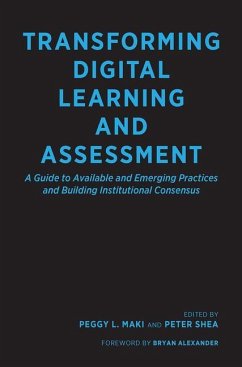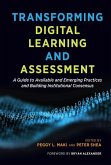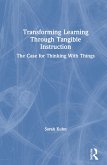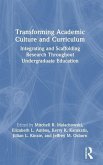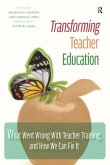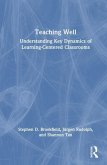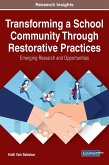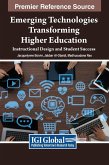Transforming Digital Learning and Assessment
A Guide to Available and Emerging Practices and Building Institutional Consensus
Herausgeber: Maki, Peggy L.; Shea, Peter
186,99 €
inkl. MwSt.
**Unverbindliche Preisempfehlung des Herstellers
Versandkostenfrei*Versandfertig in 1-2 Wochen

93 °P sammeln
Transforming Digital Learning and Assessment
A Guide to Available and Emerging Practices and Building Institutional Consensus
Herausgeber: Maki, Peggy L.; Shea, Peter
- Gebundenes Buch
- Merkliste
- Auf die Merkliste
- Bewerten Bewerten
- Teilen
- Produkt teilen
- Produkterinnerung
- Produkterinnerung
This book provides higher education leaders with the context they need to position their institutions in the changing online environment, and with guidance to build support in a period of transition.
Andere Kunden interessierten sich auch für
![Transforming Digital Learning and Assessment Transforming Digital Learning and Assessment]() Transforming Digital Learning and Assessment50,99 €
Transforming Digital Learning and Assessment50,99 €![Transforming Learning Through Tangible Instruction Transforming Learning Through Tangible Instruction]() Sarah KuhnTransforming Learning Through Tangible Instruction185,99 €
Sarah KuhnTransforming Learning Through Tangible Instruction185,99 €![Transforming Academic Culture and Curriculum Transforming Academic Culture and Curriculum]() Transforming Academic Culture and Curriculum185,99 €
Transforming Academic Culture and Curriculum185,99 €![Transforming Teacher Education Transforming Teacher Education]() Transforming Teacher Education40,99 €
Transforming Teacher Education40,99 €![Teaching Well Teaching Well]() Stephen D. BrookfieldTeaching Well185,99 €
Stephen D. BrookfieldTeaching Well185,99 €![Transforming a School Community Through Restorative Practices Transforming a School Community Through Restorative Practices]() Holli Vah SeliskarTransforming a School Community Through Restorative Practices158,99 €
Holli Vah SeliskarTransforming a School Community Through Restorative Practices158,99 €![Emerging Technologies Transforming Higher Education Emerging Technologies Transforming Higher Education]() Emerging Technologies Transforming Higher Education176,99 €
Emerging Technologies Transforming Higher Education176,99 €-
-
-
This book provides higher education leaders with the context they need to position their institutions in the changing online environment, and with guidance to build support in a period of transition.
Hinweis: Dieser Artikel kann nur an eine deutsche Lieferadresse ausgeliefert werden.
Hinweis: Dieser Artikel kann nur an eine deutsche Lieferadresse ausgeliefert werden.
Produktdetails
- Produktdetails
- Verlag: Routledge
- Seitenzahl: 338
- Erscheinungstermin: 16. Februar 2021
- Englisch
- Abmessung: 235mm x 157mm x 23mm
- Gewicht: 641g
- ISBN-13: 9781620369869
- ISBN-10: 1620369869
- Artikelnr.: 60157332
- Herstellerkennzeichnung
- Libri GmbH
- Europaallee 1
- 36244 Bad Hersfeld
- gpsr@libri.de
- Verlag: Routledge
- Seitenzahl: 338
- Erscheinungstermin: 16. Februar 2021
- Englisch
- Abmessung: 235mm x 157mm x 23mm
- Gewicht: 641g
- ISBN-13: 9781620369869
- ISBN-10: 1620369869
- Artikelnr.: 60157332
- Herstellerkennzeichnung
- Libri GmbH
- Europaallee 1
- 36244 Bad Hersfeld
- gpsr@libri.de
Peggy L. Maki, PhD in literature and linguistics, University of Delaware, writes, speaks about, and consults with higher education organizations and institutions on the process of assessing student learning, an internally motivated and shared commitment to currently enrolled students' equitable progress toward achieving high-quality learning outcomes. She has consulted at over 610 institutions in the United States and abroad and has written books and articles on assessment for more than 20 years. Her previous book, Real-Time Student Assessment: Meeting the Imperative for Improved Time to Degree, Closing the Opportunity Gap, and Assuring Student Competencies for 21st-Century Needs (Stylus, 2017), challenges institutions to prioritize the use of chronological assessment results to benefit enrolled students compared with the more common practice of prolonged assessment cycles that generally benefit future students. She served as the former American Association for Higher Education's (AAHE) senior scholar on assessment; a consultant in the Association of American Colleges & Universities' (AAC&U's) annual General Education and Assessment Institutes; and a member of several advisory boards, including one for the Lumina Foundation. Currently, she serves on the National Institute for Learning Outcomes Assessment (NILOA) advisory board. Recently an accredited organization in the United Kingdom invited her to design and teach online professional development courses and workshops among those it offers worldwide to higher education. She is the recipient of a national teaching award, the Lindback Award for Distinguished Teaching.
Foreword-Bryan Alexander AcknowledgmentsIntroduction - Peggy L. Maki Part
One. An Introduction to Current and Emerging 21st-Century Learning
Technologies 1. The Evolving Landscape of 21st-Century Learning
Technologies-Peggy L. Maki 2. The Learning Sciences and Educational
Technology-Kristen DiCerbo and Daniel Belenky 3. Empowering Faculty to
Design Technology-Enriched Student Learning. A Constructivist and
Connectivist Hybrid Massive Open Online Course-Roberta (Robin. Sullivan,
Cherie van Putten, Emily Cole, Katrina Fulcher-Rood, Jessica Kruger, Gina
Sipley, Rachel Rigolino, and Jennifer H. Herman 4. A Guide for Successful
Integration and Support of Educational Technologies-Danielle Leek, Matthew
Olson, and Peter Shea Part Two. Some Representative Examples of
Course-Based Use of Emerging Learning Technologies 5. Applying a Learning
Analytics Approach to Support Successful Course Achievement. Using Data
Stored in Learning Management Systems-Pauline Salim Muljana, Greg V.
Placencia, and Tian Luo 6. Data-Informed Online Discussion Facilitation.
Using Data From a Social Network Analysis App to Improve Students' Online
Interactions-Jing Qi 7. Teaching, Technology, and Building Trust. What I've
Learned About How AI Can Improve Student Writing-Jamey Heit 8. How We May
Learn. Cybersecurity Awareness Training as a Model for Future Learning
Platforms-Peter Shea and Bora Aytun Part Three. Adoption and Integration of
Learning Technologies Across The Institution. Case Studies 9. Enabling a
Solution for Assessment and Technology-Ruth Newberry, Robin Robinson, and
Adriana Bosha 10. Advancing General Education Assessment Through Faculty
and Student Engagement With College-Wide Electronic Portfolios and an
Assessment Portfolio-Kem Barfield 11. Assessment and Technology Use at a
Graduate Health University-Melanie Davis, Jordan Farris, Jill Matejcik,
Forrest Bollow, Lise McCoy, Arron Hunt, and Ammar Musawi ContributorsIndex
One. An Introduction to Current and Emerging 21st-Century Learning
Technologies 1. The Evolving Landscape of 21st-Century Learning
Technologies-Peggy L. Maki 2. The Learning Sciences and Educational
Technology-Kristen DiCerbo and Daniel Belenky 3. Empowering Faculty to
Design Technology-Enriched Student Learning. A Constructivist and
Connectivist Hybrid Massive Open Online Course-Roberta (Robin. Sullivan,
Cherie van Putten, Emily Cole, Katrina Fulcher-Rood, Jessica Kruger, Gina
Sipley, Rachel Rigolino, and Jennifer H. Herman 4. A Guide for Successful
Integration and Support of Educational Technologies-Danielle Leek, Matthew
Olson, and Peter Shea Part Two. Some Representative Examples of
Course-Based Use of Emerging Learning Technologies 5. Applying a Learning
Analytics Approach to Support Successful Course Achievement. Using Data
Stored in Learning Management Systems-Pauline Salim Muljana, Greg V.
Placencia, and Tian Luo 6. Data-Informed Online Discussion Facilitation.
Using Data From a Social Network Analysis App to Improve Students' Online
Interactions-Jing Qi 7. Teaching, Technology, and Building Trust. What I've
Learned About How AI Can Improve Student Writing-Jamey Heit 8. How We May
Learn. Cybersecurity Awareness Training as a Model for Future Learning
Platforms-Peter Shea and Bora Aytun Part Three. Adoption and Integration of
Learning Technologies Across The Institution. Case Studies 9. Enabling a
Solution for Assessment and Technology-Ruth Newberry, Robin Robinson, and
Adriana Bosha 10. Advancing General Education Assessment Through Faculty
and Student Engagement With College-Wide Electronic Portfolios and an
Assessment Portfolio-Kem Barfield 11. Assessment and Technology Use at a
Graduate Health University-Melanie Davis, Jordan Farris, Jill Matejcik,
Forrest Bollow, Lise McCoy, Arron Hunt, and Ammar Musawi ContributorsIndex
Foreword-Bryan Alexander AcknowledgmentsIntroduction - Peggy L. Maki Part
One. An Introduction to Current and Emerging 21st-Century Learning
Technologies 1. The Evolving Landscape of 21st-Century Learning
Technologies-Peggy L. Maki 2. The Learning Sciences and Educational
Technology-Kristen DiCerbo and Daniel Belenky 3. Empowering Faculty to
Design Technology-Enriched Student Learning. A Constructivist and
Connectivist Hybrid Massive Open Online Course-Roberta (Robin. Sullivan,
Cherie van Putten, Emily Cole, Katrina Fulcher-Rood, Jessica Kruger, Gina
Sipley, Rachel Rigolino, and Jennifer H. Herman 4. A Guide for Successful
Integration and Support of Educational Technologies-Danielle Leek, Matthew
Olson, and Peter Shea Part Two. Some Representative Examples of
Course-Based Use of Emerging Learning Technologies 5. Applying a Learning
Analytics Approach to Support Successful Course Achievement. Using Data
Stored in Learning Management Systems-Pauline Salim Muljana, Greg V.
Placencia, and Tian Luo 6. Data-Informed Online Discussion Facilitation.
Using Data From a Social Network Analysis App to Improve Students' Online
Interactions-Jing Qi 7. Teaching, Technology, and Building Trust. What I've
Learned About How AI Can Improve Student Writing-Jamey Heit 8. How We May
Learn. Cybersecurity Awareness Training as a Model for Future Learning
Platforms-Peter Shea and Bora Aytun Part Three. Adoption and Integration of
Learning Technologies Across The Institution. Case Studies 9. Enabling a
Solution for Assessment and Technology-Ruth Newberry, Robin Robinson, and
Adriana Bosha 10. Advancing General Education Assessment Through Faculty
and Student Engagement With College-Wide Electronic Portfolios and an
Assessment Portfolio-Kem Barfield 11. Assessment and Technology Use at a
Graduate Health University-Melanie Davis, Jordan Farris, Jill Matejcik,
Forrest Bollow, Lise McCoy, Arron Hunt, and Ammar Musawi ContributorsIndex
One. An Introduction to Current and Emerging 21st-Century Learning
Technologies 1. The Evolving Landscape of 21st-Century Learning
Technologies-Peggy L. Maki 2. The Learning Sciences and Educational
Technology-Kristen DiCerbo and Daniel Belenky 3. Empowering Faculty to
Design Technology-Enriched Student Learning. A Constructivist and
Connectivist Hybrid Massive Open Online Course-Roberta (Robin. Sullivan,
Cherie van Putten, Emily Cole, Katrina Fulcher-Rood, Jessica Kruger, Gina
Sipley, Rachel Rigolino, and Jennifer H. Herman 4. A Guide for Successful
Integration and Support of Educational Technologies-Danielle Leek, Matthew
Olson, and Peter Shea Part Two. Some Representative Examples of
Course-Based Use of Emerging Learning Technologies 5. Applying a Learning
Analytics Approach to Support Successful Course Achievement. Using Data
Stored in Learning Management Systems-Pauline Salim Muljana, Greg V.
Placencia, and Tian Luo 6. Data-Informed Online Discussion Facilitation.
Using Data From a Social Network Analysis App to Improve Students' Online
Interactions-Jing Qi 7. Teaching, Technology, and Building Trust. What I've
Learned About How AI Can Improve Student Writing-Jamey Heit 8. How We May
Learn. Cybersecurity Awareness Training as a Model for Future Learning
Platforms-Peter Shea and Bora Aytun Part Three. Adoption and Integration of
Learning Technologies Across The Institution. Case Studies 9. Enabling a
Solution for Assessment and Technology-Ruth Newberry, Robin Robinson, and
Adriana Bosha 10. Advancing General Education Assessment Through Faculty
and Student Engagement With College-Wide Electronic Portfolios and an
Assessment Portfolio-Kem Barfield 11. Assessment and Technology Use at a
Graduate Health University-Melanie Davis, Jordan Farris, Jill Matejcik,
Forrest Bollow, Lise McCoy, Arron Hunt, and Ammar Musawi ContributorsIndex
